

Bibliothèque virtuelle Verbes. Verb Tenses. Presents tenses Infographics. Conditionals. What are conditionals in English grammar?
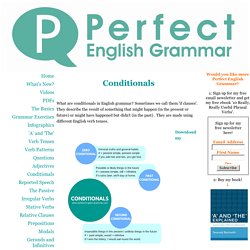
Sometimes we call them 'if clauses'. They describe the result of something that might happen (in the present or future) or might have happened but didn't (in the past) . They are made using different English verb tenses. Download my infographic! There are four kinds of conditionals: The Zero Conditional: (if + present simple, ... present simple) If you heat water to 100 degrees, it boils.Click here to learn more.The First Conditional: (if + present simple, ... will + infinitive) If it rains tomorrow, we'll go to the cinema.Click here to learn more.The Second Conditional: (if + past simple, ... would + infinitive) If I had a lot of money, I would travel around the world.Click here to learn more.The Third Conditional (if + past perfect, ... would + have + past participle) If I had gone to bed early, I would have caught the train.Click here to learn more.
The Passive. An active sentence like I drank two cups of coffee has the subject first (the person or thing that does the verb), followed by the verb, and finally the object (the person or thing that the action happens to).
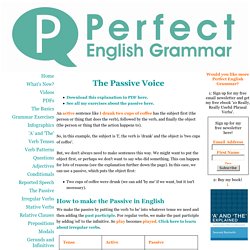
So, in this example, the subject is 'I', the verb is 'drank' and the object is 'two cups of coffee'. But, we don't always need to make sentences this way. State Verbs. Some English verbs, which we call state, non-continuous or stative verbs, aren't used in continuous tenses (like the present continuous, or the future continuous).
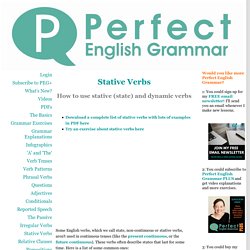
These verbs often describe states that last for some time. Here is a list of some common ones: Stative (or State) Verb List A verb which isn't stative is called a dynamic verb, and is usually an action. Gerunds and Infinitives. It can be a little difficult to know when to use gerunds and infinitives.
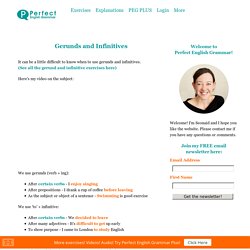
(See all the gerund and infinitive exercises here) Here's my video on the subject: We use gerunds (verb + ing): After certain verbs - I enjoy singingAfter prepositions - I drank a cup of coffee before leavingAs the subject or object of a sentence - Swimming is good exercise We use 'to' + infinitive: After certain verbs - We decided to leaveAfter many adjectives - It's difficult to get up earlyTo show purpose - I came to London to study English. Participle Clauses. Reduced Relative Clauses (Download this page in PDF here.)
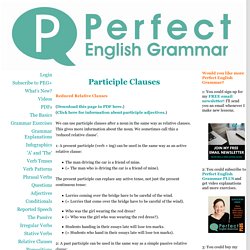
(Click here for information about participle adjectives.) We can use participle clauses after a noun in the same way as relative clauses. This gives more information about the noun. We sometimes call this a 'reduced relative clause'. 1: A present participle (verb + ing) can be used in the same way as an active relative clause: The man driving the car is a friend of mine.(= The man who is driving the car is a friend of mine). The present participle can replace any active tense, not just the present continuous tense: Lorries coming over the bridge have to be careful of the wind.(= Lorries that come over the bridge have to be careful of the wind).Who was the girl wearing the red dress?
Verb Patterns. Irregular Verbs. How confident are you about English irregular verbs?
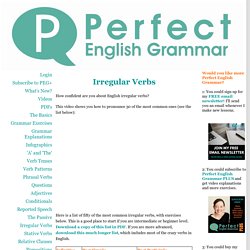
This video shows you how to pronounce 50 of the most common ones (see the list below): Here is a list of fifty of the most common irregular verbs, with exercises below. This is a good place to start if you are intermediate or beginner level. Download a copy of this list in PDF. If you are more advanced, download this much longer list, which includes most of the crazy verbs in English.Try an exercise about the past simple (part 1) of the first 25 irregular verbs here Try an exercise about the past simple (part 2) of the other 25 hereHere's an exercise about the past participle (part 1) of the first 25 verbsAnd an exercise about the past participle (part 2) of the second 25 If you want to learn more about the tenses, especially about how to use them when you're speaking, you could try my video course, Terrific Tenses, which is part of Perfect English Grammar Plus.
Modal Verbs. Verbes modaux en anglais. Dans la grammaire anglaise, les verbes modaux ou auxiliaires de modalité sont des auxiliaires qui donnent le point de vue de l'énonciateur sur l'énoncé.
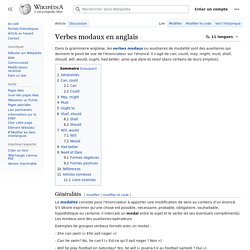
Il s'agit de can, could, may, might, must, shall, should, will, would, ought, had better, ainsi que dare et need (dans certains de leurs emplois). Généralités[modifier | modifier le code] Exemples de groupes verbaux formés avec un modal : - She can swim (« Elle sait nager ») - Can he swim? - Will he play football on Saturday? Caractéristiques des modaux : Ils sont directement suivis de la base verbale (modal + infinitif sans to) (sauf ought, qui est directement suivi de l'infinitif avec to), ou d'un adverbe qui est suivi de la base verbale.
. - Yes, she can / No, he won't Dans un groupe verbal, il ne peut y avoir qu'un seul modal (sauf dans le sud des États-Unis).Ce sont des opérateurs. Can, could[modifier | modifier le code] Can[modifier | modifier le code] Phrasal verbs ! What's ? Un phrasal verb, appelé aussi verbe à particule, est un verbe auquel on va adjoindre un autre mot, une particule, afin d’en modifier le sens.
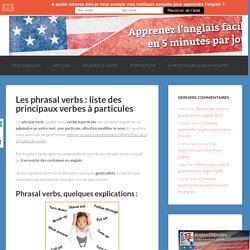
En ajoutant cette particule, on peut même obtenir un sens complètement différent du sens d’origine du verbe !